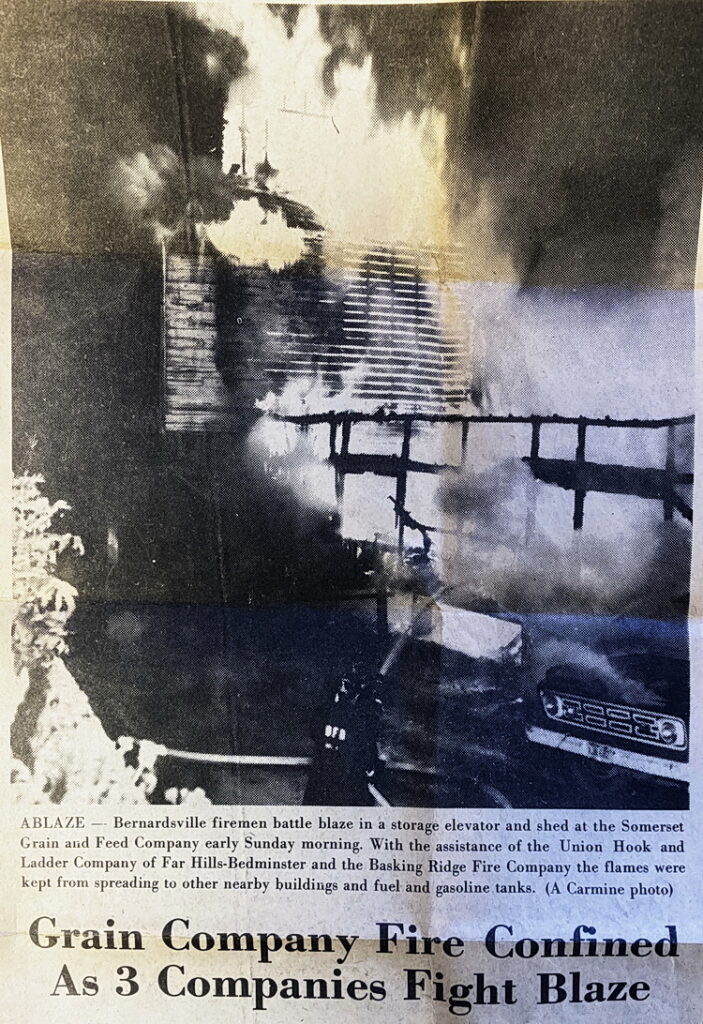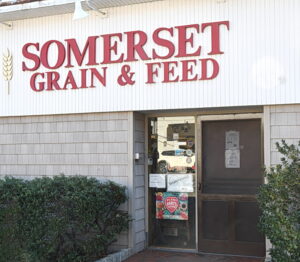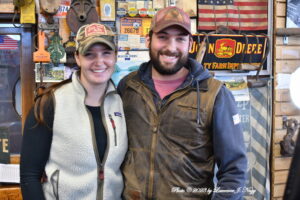There’s more to Somerset Grain & Feed than its name implies.
In addition to selling sustenance for horses and other animals, grooming tools, pet toys and various agricultural items, it is also a quaint mini museum on the outskirts of suburban Bernardsville, New Jersey’s, shopping district.
Somerset Grain is very down-home, almost as if it doesn’t belong there. And in less than six months, it won’t.
The business that hearkens back to an earlier era and its country roots is moving 10 miles west to the more rural Long Valley section of Washington Township, Morris County. But it won’t be changing its style or its name.
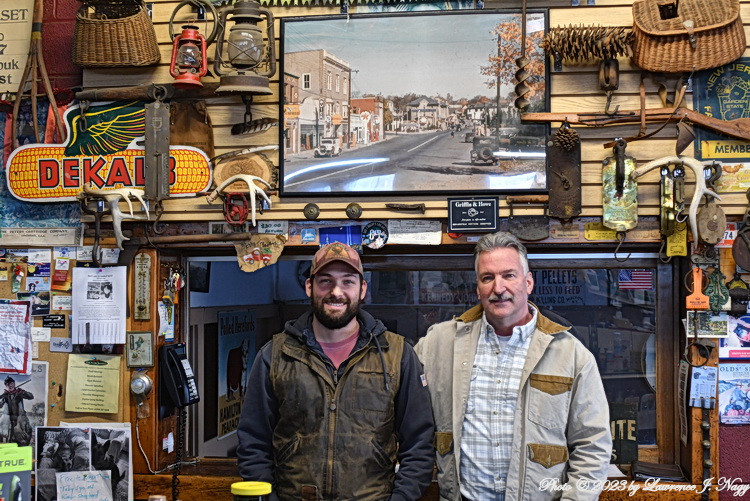
Tom Milesnick and his son, Jesse, left at the counter of Somerset Grain and Feed. (Photo © 2023 by Lawrence J. Nagy)
“That’s who we are,” proprietor Tom Milesnick stated proudly.
“We’re a feed store. That’s our identity.”
The move is the rainbow at the end of an 18-year quest for Tom, who is in business with his 26-year-old son, Jesse. Tom doesn’t own the Bernardsville building and the rent kept rising, so he needed to set up shop elsewhere. The former UPS facility where he’s headed fills the ticket. And while it’s spacious, with room for tractor-trailers and trucks to maneuver more easily than at the Bernardsville site, the location also is appropriate because Long Valley and neighboring Hunterdon County have more farms in this era than northern Somerset County.
“Back in the day, we had all these big estates,” Tom recalled, citing such historic Bernardsville family names as Roebling and Post. Early in the last century, they would mail the store their orders, written in perfect penmanship, for 5,000 pounds of cattle feed or 1,000 pounds of sheep feed, and the business would run it up to them.
As time went on, the farm owners died, the barns got converted to houses, the acreage was carved up “and there’s no more big estates,” sighed Tom, guessing there might be just a “backyard pony or two” left in Bernardsville, where bridle trails once wound through the borough.
In the bigger picture, though, he has always dealt with farm owners in nearby Bedminster and Harding Township, as well as places further afield, such as Oldwick.
“Thank goodness this area’s still equine, and thank goodness for the people who do have the means to preserve what we have,” he said.
Tom congratulated the officials of Washington Township, telling them “You have maintained the integrity of this valley, you’ve let it grow, let new business come in, without compromising it.”
The chickens, horses, pigs and other livestock still have a home there, he pointed out.
Many of those who have been coming to Somerset Grain for years will redirect their GPS settings for the new venue on East Mill Road.
Asked for his opinion of the move, customer Rob Pullam said, “I don’t know if it’s good for Bernardsville, but it’s fine for us. I’m quite excited.”
The Bedminster resident and farm manager added, “Where they’re going is not that far from us, and it’s a different direction. Now we’re going to go somewhere else and see the same people.”
But for others who have dropped in at Somerset Grain on a regular basis for years, it’s the end of an era.
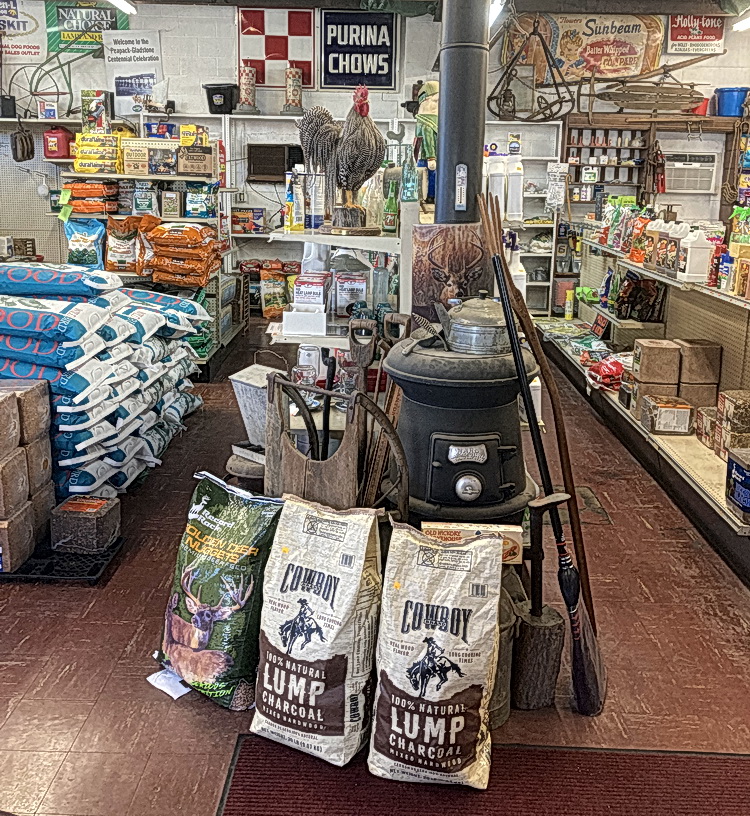
The potbellied stove at the end of one of Somerset Grain’s eclectic aisles will be moving to Long Valley. (Photo © 2023 by Lawrence J. Nagy)
“I’m really sorry that they’re going to Long Valley, which is too far for me,” said longtime regular customer Simona Balzer of Bernardsville, who was buying a Christmas present for her daughter’s dog the other day.
“It’s so fun to come here. This store is something. It has so much history,” she noted wistfully.
Somerset Grain, which opened in 1945, is the third feed store on the Bernardsville site. The first one, in the late 1800s, was Bob White and Son. Tom found a pen from that store at a sale and it’s a treasured artifact, marked with the White store’s phone number, 209. That is not an area code; there just weren’t that many phones back then. After Bob White, the store became Barker and Higgins before it was Somerset Grain.
At one time, dating back to the late nineteenth century, grain was milled at the location. Before the advent of tractor-trailers, train cars filled with different grains would come to the store via a siding from the main track. Workers shoveled loose grain from the cars, then sent it up the three-story tower to get ground. The finished product went into 100-pound bags secured with a miller’s knot. The empty rail cars would roll back to the main track and get hooked up to the train again.
Tom pointed out that the feed store “was the gas station of its time.”
It fueled the horses who pulled the wagons and livestock; “everything was powered by the feed store,” he commented.
Well-schooled in the business, Tom is adamant about “the right way to run a feed mill, order six days worth of feed every seven days. You only stayed a little bit ahead of your stock and got new every week. The less time we have the feed,” he explained, “the longer you can keep it.”
A disastrous fire put an end to the milling operation in 1968, as hay and grain fed the blaze for three days. The fire was suspicious, but no one ever determined how it started, and Tom noted that G.F. Hill in Gladstone also burned around the same time.
Asked whether he will miss the old store, Tom said, “I’ve been coming here 42 years. I’ve been here more than I’ve been in my own house.”
So there’s nostalgia, but he quickly added, “I’m excited about the future.”
Before coming to Somerset Grain, Tom was working at the Veterans Administration supply depot in south Somerville.
“It was crazy money for a kid,” he noted, but punching a time clock and working in a place surrounded by barbed wire wasn’t for him. When a new employee came to the depot after leaving a job at the feed store in 1981, Tom saw an opportunity. Although he’d been earning $14 an hour, he took a huge cut to $5.75 an hour when he got a job from Pete Mastrobattista, who owned Somerset Grain at that time.
Pete couldn’t believe Tom wanted to give up his secure government job, and neither could Tom’s mother.
He remembered, “My mother cried, she grabbed my arm and said, `You’re not thinking clearly.’ ”
He replied, “I’m being true to my heart. This is what I want to do.”
It turned out to be the right decision.
“I’ve enjoyed every day in this place,” he declared.
Every weekend, “I couldn’t wait to come back here on Monday morning. I can’t believe I’m getting paid to do this. It’s been freedom.”
Tom remembers in the early ’80s, he’d get to the store when it was pitch black outside and three or four farmers already were waiting for the doors to open, reading the newspaper with their trucks’ cab lights on. They’d come in as soon as he turned the key, share a pot of coffee and talk about their animals and their crops.
“Those were the good old days,” said Tom.
“Thank goodness I got a chance to see that old guard.”
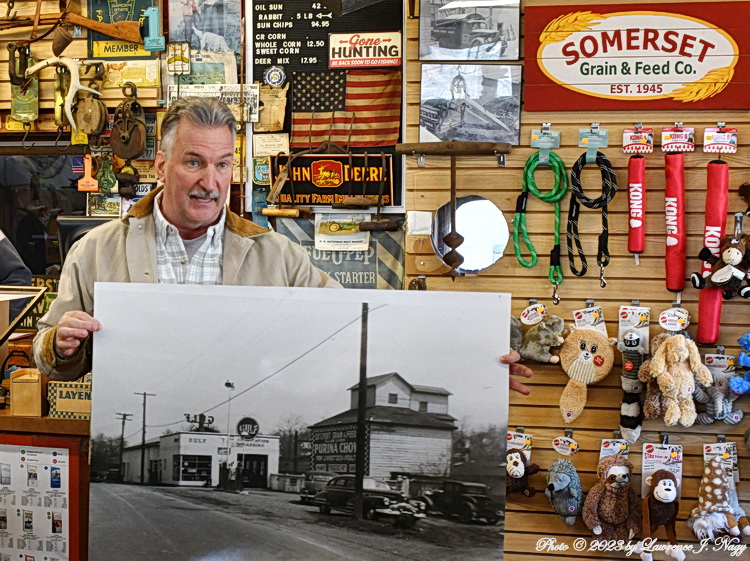
Tom holds a photo of the old store from the 1940s or early 1950s. You can see the milling tower that would be destroyed in a fire years later rising above the building. (Photo © 2023 by Lawrence J. Nagy)
Now his enthusiasm has refreshed, as he’s eager to open a new place and become part of the scene in Long Valley.
“I’m coming in there to make friends with everyone. I want to reach out to the people of that area. I want to know, `What would you like us to bring in?’ ”
Tom plans to devote an aisle to Long Valley products, such as honey, sausage, items from the “home farms.”
“Socks, soap, sauce,” he elaborated.
Prior to the move-in, he’s gutting the interior of the building that was in the Hemmings family for 90 years and once housed a moving company.
“I want it all wood and barn beams,” Tom noted.
“When you walk in there, I want you to think you walked into somebody’s barn. We’re going to have the wood stove, my old signs.”
The ones relating to Bernardsville will stay in the borough, because they are part of its history. But the others undoubtedly will pique the interest of their new audience in Long Valley.
They are an eclectic bunch, those signs and accompanying memorabilia, including the Kennedy/Johnson 1960 presidential campaign poster he rescued from a dumpster, and the one from a poultry feed company advising chickens to, “Lay or Bust.”
Tom found that in the old portion of his store when he was using a broom handle to break ceiling panels, having considered that area a possible fire hazard.
After he gave the ceiling a good poke, “down came this treasure trove of stuff,” including invoices from the 1900s and sadly, a dead cat who had succumbed to the 1968 fire.
The current store was built in 1947 as an addition to the original structure, where wooden bins used to hold barley, whole oats, bran, cracked corn and grass seed. Tom ripped out the wooden bins and stopped weighing out the merchandise. Instead of 10 pounds of flax, customers had to buy a bag of it. The floor was too weak for the weight of the bags, so it was shored up with metal—coffee cans, license plates, old road department signs, and insulated with hay to keep the heat in. Tom replaced the floor, keeping only a bit of it for the sake of nostalgia.
Tom grew up with dogs, and seeing to the pheasants and quail his family raised.
“That’s where the responsibility came of taking care of a domestic animal; domestic animals are dependent on us. That rang true with me,” Tom observed.
“People need us. We’re tougher than the mailman or the banks.”
No matter the weather, “we show up and deliver feed, even when you wouldn’t let your dog go out. If you’ve got a 1,200 pound animal that’s hungry, kicking the walls, what are you going to say?”
Rain, snow, sleet, whatever, “We go.”
Tierney Sullivan, who ran Coach Stop saddlery in Bedminster from 1979 to 2015, noted Tom “has stood the test of time. As far as the local horse community goes, he’s kind of like the glue.”
Tierney and Tom would share customers and help each other out; if he needed a green halter, she’d send it along; if she needed Farrier’s Formula, he’d provide it.
“He fed them and I outfitted them,” she said.
Tom, who is 64, at some point down the road will retire and hand the business over to Jesse.
He has another son who is in information technology, but Jesse “likes this kind of work. He and I are exactly alike,” Tom mused.
“He’s a hard-working, good kid.”
Jesse started working at the store when he was in high school, going full-time in 2019. It was always assumed he’d take over the business.
“I never fought it,” he said with a smile.
“It’s always been like a second home to me, because I basically have grown up here. It will be nice to have something we can put money into and improve, something for the long run.”
Jesse is getting some part-time help from his girlfriend, Brianna Graf. Formerly a whipper-in for the Essex Foxhounds, she now has a job on a horse farm and her own MagnaWave business, providing therapy to horses. The two met when she was picking up feed at the store, and they obviously have a lot in common.
She notes her extensive equine background is a real plus in assisting customers with questions about their horses.
Somerset Grain is all about service, doing the basics and doing them right, without bells and whistles.
“There are certain things that deserve to be kept simple, and this is one of them,” said Tom.
“It gives you good purpose.”
Tom noted the one downside of the move is that “We’re going to lose a handful of my older customers in their 80s that buy their birdseed. Them I’m going to miss; they’re not going to drive 10 more miles to get bird seed. We do have a couple of people with some driving issues and we bring birdseed to their porch. We still will do that. We can’t forget you.”

